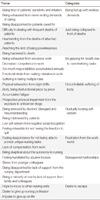Abstract
Purpose
This study was done to understand the meanings and nature of experiences of the burnout of nurses working in oncology wards.
Methods
The hermeneutic phenomenology developed by van-Manen was used. The period for data collection was from November, 2006 to May, 2007. This study took place in 3 university hospitals in B & U cities. Nine nurses working in oncology wards participated. Data collection was done through individual in-depth interviews.
Results
The eight most common themes demonstrated by participants from this study were 'being fed up with endless demands', 'collapsing in front of deaths', 'gasping for breath due to overwhelming tasks', 'uncontrollable suffering of body', 'gradually loosing self-esteem', 'frustration from the work world', 'beleaguered relationships', and 'desire to escape'.
Figures and Tables
References
1. National Cancer Information Center. accessed on 10 January 2012. Available at: http://www.cancer.go.kr/cms/statics/incidence/index.html.
2. Fairbrother CA, Paice JA. Life's final journey: the oncology nurs's role. Clin J Oncol Nurs. 2005. 9:575–579.
3. Kim YR. A study on the turnover intention of the oncology nurse [dissertation]. 2007. Gwangju: Chonnam National Univ..
4. Barnard D, Street A, Love AW. Relationships between stressors, work supports, and burnout among cancer nurses. Cancer Nurs. 2006. 29:338–345.

5. Quattrin R, Zanini A, Nascig E, Annunziata M, Calligaris L, Brusaferro S. Level of burnout among nurses working in oncology in Italian region. Oncol Nurs Forum. 2006. 33:815–820.
6. Kim HS. Comparative study regarding health condition and work stress of nurses working in cancer ward and general ward. J Korean Oncol Nurs. 2001. 1:191–203.
7. Medland J, Howard-Ruben J, Whitaker E. Fostering psychosocial wellness in oncology nurses: addressing burnout and social support in the workplace. Oncol Nurs Forum. 2004. 31:47–54.

8. Jeong SH. Burnout in dialysis nurses: a comparison to nurses on the general medical ward [dissertation]. 2002. Seoul: Kyunghee Univ..
9. Lim DS, Cho BH. The study on stress, hardiness, and professional burnout of intensive care unit nurses. J Korean Acad Fundam Nurs. 2007. 14(1):120–127.
10. Park JU. The relationship between job stress and burnout of psychiatric nurse [dissertation]. 2007. Seoul: Ewha Womans Univ..
11. Hwang JY. Relationship between burnout and job satisfaction of employees in geriatric specialist hospitals [dissertation]. 2003. Seoul: Kyunggi Univ..
12. Seo MJ. Burnout and coping type of oncology nurse [dissertation]. 2000. Seoul: Yonsei Univ..
13. Park HS, Hwang HN. Burnout of intensive care unit. Korean Nurse. 2003. 42(4):56–82.
14. van Manen M. Researching lived Experience. 1997. New York: Sunny Publishers.
15. Morse JM, Field PA. Qualitative research methods for health professionals. 1995. 2nd ed. California: Sage Publishers.
16. Lincoln YS, Guba EG. Effective evaluation. 1985. 4th ed. San Francisco: Jossey-Bass Publishers.
17. Shin MH, Shin SR. Predictors of burnout among oncology nurses. J Korean Oncol Nurs. 2003. 3(1):75–84.
18. Grunfeld E, Whelan T, Zitzelsberger L, Willan A, Montesanto B, Evans W. Cancer care workers in Ontrio: prevalance of burnout, job stress, and job satisfaction. CMAJ. 2000. 163:166–169.
19. Vachon MLS. Ferrell BR, Coyle N, editors. The nurses' role: the world of palliative care nursing. Textbook of palliative nursing. 2001. New York: Oxford University Press;647–662.
20. Park MS, Yoo YS. Burden, job satisfaction, and quality of life of nurses caring for cancer patients. Korean J Hosp Palliat Care. 2005. 8(1):8–17.
21. Boyle D. Pathos in practice: exploring the effective domain of oncology nursing. Oncol Nurs Forum. 2000. 27:915–919.
22. Kim MJ, Gu MO. The development of the stress measurement tool. J Nurs Acad Soc. 1984. 14(2):28–37.
23. Park JJ. The study on the job stress and the satisfaction of cancer unit nurses [dissertation]. 2006. Seoul: Hanyang Univ..
24. Park SY. The effect of value clarification training (VCT) on nurses' professional self-concept, job motivation and job satisfaction. J Kyungpook Nurs Sci. 2004. 8:31–42.
25. Noh CH, Sohng KY. Survey on the relationship self-esteem and professional self-concept of nurses. J Korean Acad Fundam Nurs. 1997. 4(1):61–71.
26. Hinds PS, Quargnenti AG, Hickey SS, Mangum GH. A comparision of the stress-response sequence in new and experienced pediatric oncology nurses. Cancer Nurs. 1994. 17:61–71.
27. Cummings GG, Olson K, Hayduck L, Bakker D, Fitch M, Green E. The relatiponship between nursing leadership and nurses' job satisfaction in Canadian oncology work environments. J Nurs Manag. 2008. 16:508–518.

28. Gifford BD, Zammuto RF, Goodman EA. The relationship between hospital unit culture and nurses' quality of work life. J Healthc Manag. 2002. 47(1):13–25.

29. Lee SM. The effect of job characteristics and personal factors on work stress, job satisfaction and turnover intention. J Nurs Acad Soc. 1995. 25(4):790–806.

30. Lee HJ. Comparative study regarding job stress and burnout of nurses working in operative ward and general ward [dissertation]. 2000. Jeonju: Chonbuk National Univ..




 PDF
PDF ePub
ePub Citation
Citation Print
Print



 XML Download
XML Download